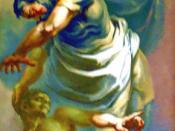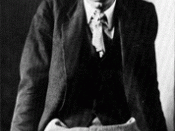Aldous Huxley's Brave New World portrays a world in which pain and suffering have been all but eliminated, where pleasure is perpetual, and where society is immersed in stability. In a world such as this, the novel argues, there is no need for God and religion. God is simply a response to human suffering, and since there is no suffering in the novel, not even in death, God ceases to be useful. Modern society reflects a trend somewhat similar; as science has progressed and suffering and inconveniences have decreased, people have strayed from religion, preferring modern pleasantries over God. Indeed, there are many people today who would argue that, as the amount of suffering in life decreases, God becomes less and less useful. Yet, there are also those who would say that God is an objective truth, and that religious sentiments are a part of human nature. The argument between Mustapha Mond and John illustrates this conflict.
However, despite the evidence in Brave New World and the real world that God is unnecessary without suffering, there is also evidence that perhaps religion is something built into human nature, meaning that, even without suffering, God would continue to be a part of human society.
Religion has been removed from human life in the novel because, as Mustapha Mond puts it, "God isn't compatible with machinery and scientific medicine and universal happiness" (234). For Mond, God is simply a human invention used to explain and alleviate suffering and misery. Religion provides answers for death and makes dying less frightening, and God motivates people to be better, a sort of social stabilizer. Therefore, if society is already stable, death is not frightening, and happiness is universal, God is not necessary. Mond makes the relativistic argument that "Providence takes its cue from men," that...


